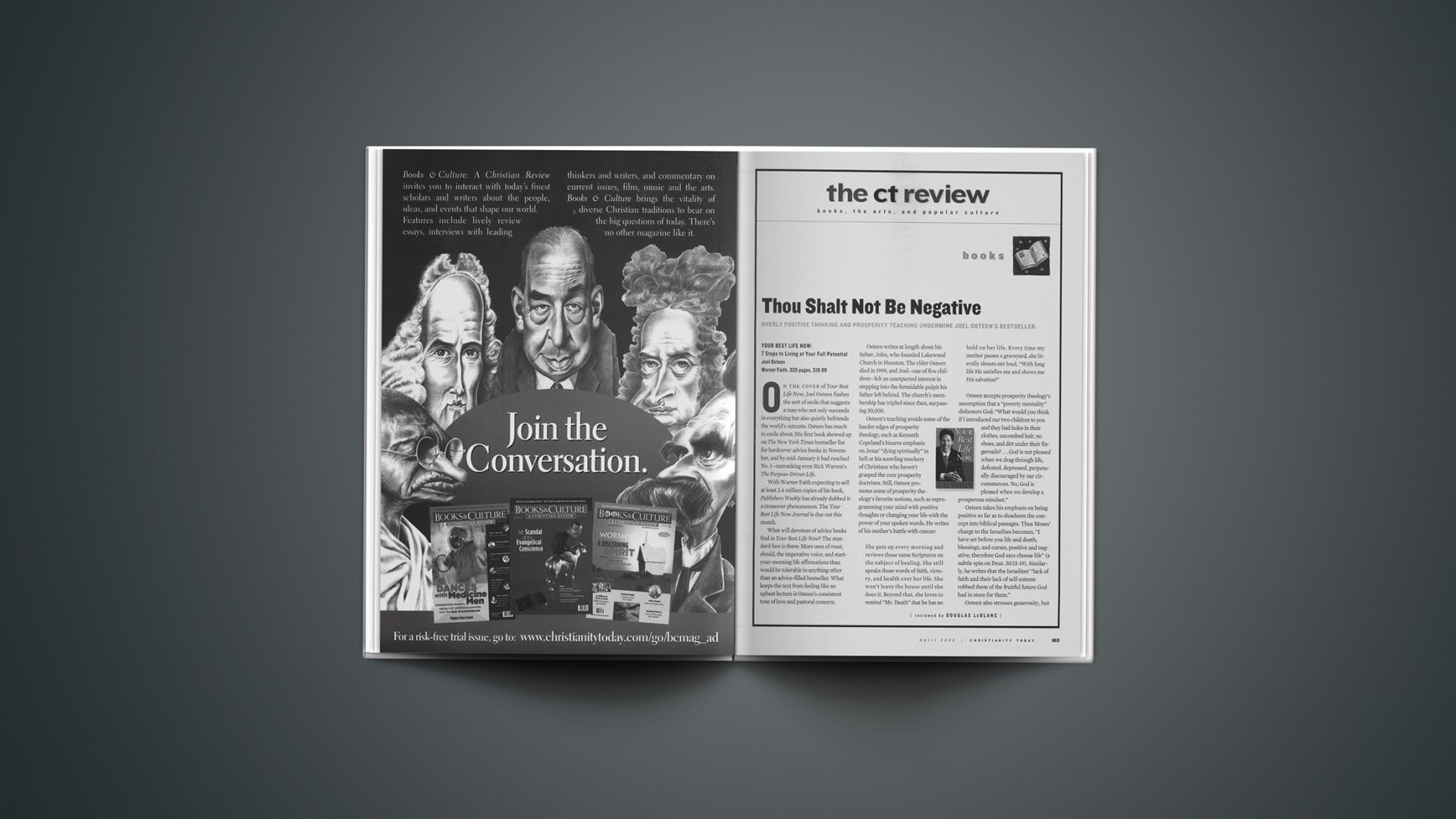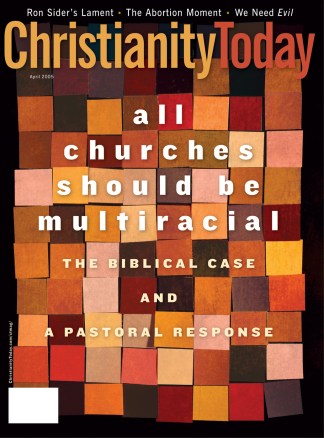On the cover of Your Best Life Now, Joel Osteen flashes the sort of smile that suggests a man who not only succeeds in everything but also quietly befriends the world’s outcasts. Osteen has much to smile about: His first book showed up on The New York Times bestseller list for hardcover advice books in November, and by mid-January it had reached No. 1—outranking even Rick Warren’s The Purpose-Driven Life.
With Warner Faith expecting to sell at least 2.4 million copies of his book, Publishers Weekly has already dubbed it a crossover phenomenon. The Your Best Life Now Journal is due out this month.
What will devotees of advice books find in Your Best Life Now? The standard fare is there: More uses of must, should, the imperative voice, and start-your-morning life affirmations than would be tolerable in anything other than an advice-filled bestseller. What keeps the text from feeling like an upbeat lecture is Osteen’s consistent tone of love and pastoral concern.
Osteen writes at length about his father, John, who founded Lakewood Church in Houston. The elder Osteen died in 1999, and Joel—one of five children—felt an unexpected interest in stepping into the formidable pulpit his father left behind. The church’s membership has tripled since then, surpassing 30,000.
Osteen’s teaching avoids some of the harder edges of prosperity theology, such as Kenneth Copeland’s bizarre emphasis on Jesus’ “dying spiritually” in hell or his scowling mockery of Christians who haven’t grasped the core prosperity doctrines. Still, Osteen promotes some of prosperity theology’s favorite notions, such as reprogramming your mind with positive thoughts or changing your life with the power of your spoken words. He writes of his mother’s battle with cancer:
She gets up every morning and reviews those same Scriptures on the subject of healing. She still speaks those words of faith, victory, and health over her life. She won’t leave the house until she does it. Beyond that, she loves to remind “Mr. Death” that he has no hold on her life. Every time my mother passes a graveyard, she literally shouts out loud, “With long life He satisfies me and shows me His salvation!”
Osteen accepts prosperity theology’s assumption that a “poverty mentality” dishonors God: “What would you think if I introduced our two children to you and they had holes in their clothes, uncombed hair, no shoes, and dirt under their fingernails? … God is not pleased when we drag through life, defeated, depressed, perpetually discouraged by our circumstances. No, God is pleased when we develop a prosperous mindset.”
Osteen takes his emphasis on being positive so far as to shoehorn the concept into biblical passages. Thus Moses’ charge to the Israelites becomes, “I have set before you life and death, blessings, and curses, positive and negative; therefore God says choose life” (a subtle spin on Deut. 30:15-19). Similarly, he writes that the Israelites’ “lack of faith and their lack of self-esteem robbed them of the fruitful future God had in store for them.”
Osteen also stresses generosity, but he tinges this with a formula he calls “In the time of need, sow a seed.” Even acts of mercy are not string-free expressions of God’s grace, but faith-building down payments in a “You can’t outgive God” account.
One of the finest chapters shows how Christians should aim for excellence and integrity. The book undercuts the emphasis on integrity, however, by suggesting trivial examples of God’s favor to the faithful: faster seating in restaurants, a last-second opening of an excellent parking space, being upgraded to first class without seeking it, and enjoying a personal exemption from an airline’s baggage policy.
Osteen tells of not wanting to check an expensive television camera on a flight to India. The counter clerk insists that the airline’s policy strictly forbids him from it carrying on, and Osteen asks if he can talk to someone else. A pilot walks up and offers to stow the camera behind the cockpit.
“The woman behind the counter glared at me and shook her head, clearly aggravated,” Osteen writes. “I just smiled and said, ‘Sorry, ma’am; it’s the favor of God.'” Or was it simply that an observant pilot intervened to prevent an unnecessary conflict (which some planning on Osteen’s part could have prevented) from escalating?
Osteen rightly notes that people do not enjoy being around chronic complainers. But he lives at the other end of the spectrum, where Christians must maintain their happiness (Osteen uses the word interchangeably with joy and peace) regardless of woes. Most people live between these two points, neither yielding to despair nor finding the silver lining behind every crisis.
Osteen issues stirring calls for people to forgive readily, to keep bitterness from taking root, and to watch their tongues. Your Best Life Now may well help heavily driven North Americans to remember there’s more to life than what kind of car they drive. For readers who know the spiritual limits of health, prosperity, and even a positive attitude, the Book of Ecclesiastes would be better reading.
Douglas LeBlanc is an editor of GetReligion.org.
Copyright © 2005 Christianity Today. Click for reprint information.
Related Elsewhere:
Your Best Life Now is available from Christianbook.com and other book retailers.
More information is available from the publisher, including an excerpt.
Joel Osteen’s website has more information about the author and his current speaking tour.
Osteen pastors Lakewood Church in Houston.
Other profiles of Osteen and his teachings include:
Osteen shares steps to realizing potential | At first glance, Joel Osteen’s new book might be mistaken for secular self-help. With an Oprah-esque title—Your Best Life Now: 7 Steps to Living at Your Full Potential—and nary a mention of Jesus on the cover, it could easily pass. (The Dallas Morning News, October 15, 2004)
Evangelist’s encouraging words are hard to resist | I admit that when Osteen comes on the tube, telling us to put our bad experiences behind us, that God loves us and that our future is bright, it’s a hard-to-resist message. While on vacation, I decided to drive a few extra miles to see what Osteen was like in person. (Fort Worth Star-Telegram, Sep. 25, 2004)
‘The smiling preacher’ builds on large following | Osteen is called “the Smiling Preacher,” and he is perhaps the hottest commodity in the world of multimedia religion these days. His is the new face of Christianity, upbeat and contemporary, media-smart with a heightened sense of entertainment and general appeal. (Washington Post, January 30, 2005)
‘Expect God’s Favor’: Interview with Joel Osteen | A rising young televangelist says that by expecting the best, we can enjoy the abundant life God wants for us. (Beliefnet)
More reviews and interviews are available from our Book page, as well as our 2004 Book Awards page.











